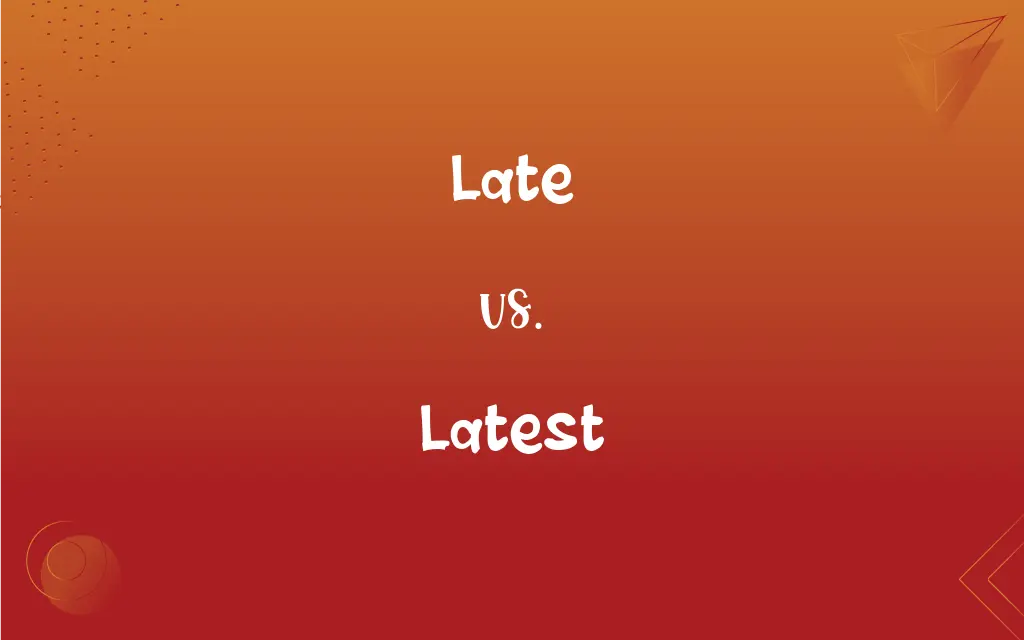Late vs. Latest: What's the Difference?
Edited by Aimie Carlson || By Harlon Moss || Updated on November 2, 2023
"Late" means delayed or deceased; "latest" refers to the most recent.

Key Differences
"Late" is used to describe someone who has passed away or an action that is overdue, whereas "latest" refers to something that is the most current or recent. In the context of time, "late" can indicate tardiness, such as arriving late to a meeting. Conversely, "latest" might be used when talking about the newest update to a software application.
When it comes to trends or news, "latest" is often used to describe the most current information available. "Late," on the other hand, does not pertain to currency but can refer to a recent period or the end of a period, such as the late evening. Even if something is the newest, "late" will never be used in this context.
The word "late" is also employed to refer to the memory of someone who has passed away, as in "the late Mr. Smith." "Latest," however, is never used in this context. Instead, it might describe the most recent work of Mr. Smith before his passing.
With regard to sequential events, "latest" signifies the event that occurred most recently, like the latest episode of a TV series. "Late" may indicate that an episode aired later than its scheduled time but does not inherently imply that it is the most recent.
"Late" can characterize something as being in the latter stages, such as "late adulthood." "Latest" will never be used for such a description; it does not signify a stage but rather the position of being at the end of a series.
ADVERTISEMENT
Comparison Chart
Definition
Being delayed or deceased.
Most recent or current.
Usage in Time
Refers to tardiness or a past deadline.
Indicates the newest or most current.
Relation to News
Not used for currency; can mean recently.
Used for the most up-to-date instance.
Sequential Order
Does not imply the most recent.
Implies the most recent in a series.
Relation to Life
Can mean deceased.
Never used to refer to deceased.
ADVERTISEMENT
Late and Latest Definitions
Late
Belonging to the final stages or latest period.
The late 19th century was a period of industrial expansion.
Latest
Reflecting the most advanced stage of development.
She's always on top of the latest trends.
Late
Deceased or no longer living.
She inherited the estate from her late aunt.
Latest
Most recent or current in a series.
The latest iPhone model boasts improved cameras.
Late
After the expected, proper, or usual time.
He apologized for his late arrival.
Latest
The final or most recent in a series of events.
The latest results show an increase in voter turnout.
Late
Slow in relation to an expected pace.
The train is running ten minutes late.
Latest
Last in order, but not necessarily related to time.
He was the latest to leave the party last night.
Late
Most recent or fresh in memory.
His heroics are still fresh because they are of late.
Latest
The most up-to-date news or information.
Have you heard the latest about the merger?
Late
Coming, occurring, continuing, or remaining after the correct, usual, or expected time; delayed
A late breakfast.
A late meeting.
Latest
Superlative of late.
Late
Occurring at an advanced hour, especially well into the evening or night
A late movie on television.
The late flight to Denver.
Latest
Something that is the most recent or current of its kind
The latest in electronic gadgetry.
FAQs
Is 'latest' ever used to describe someone who is deceased?
No, 'latest' is not used to refer to someone who is deceased.
How do you use 'latest' in a sentence?
'Latest' is used to describe the most recent event or item, like "She just bought the latest smartphone."
Can 'late' and 'latest' be used interchangeably?
No, 'late' and 'latest' have distinct meanings and are not interchangeable.
Can 'latest' be used to describe tardiness?
No, 'latest' does not describe tardiness.
What is the primary use of 'late'?
'Late' primarily refers to something that is delayed, deceased, or happening toward the end of a period.
What does it mean when someone is described as the 'late' person?
It means that the person has passed away.
Can 'late' refer to the timing of an event?
Yes, 'late' can refer to an event occurring after the scheduled time.
Can 'late' refer to something new or recent?
Yes, 'late' can refer to a recent period or to someone who has recently passed away.
Does 'latest' refer to the end stage of something?
No, 'latest' refers to the newest or most current, not necessarily the end stage.
How do media outlets use the word 'latest'?
Media outlets use 'latest' to refer to the most current news or updates.
What's another word that can be used instead of 'latest'?
'Most recent' or 'newest' can be used instead of 'latest.'
Is 'late' used to indicate something is up-to-date?
No, 'late' does not indicate that something is up-to-date.
How does 'latest' relate to time?
'Latest' relates to the most current point in time or the most recent version.
Does 'latest' imply something is last or final?
Not necessarily; 'latest' means most recent but not necessarily final.
How do you express condolences using 'late'?
You might say, "I'm sorry for the loss of your late brother."
How would you use 'latest' in terms of fashion?
'Latest' would describe the newest styles, as in "She's wearing the latest fashion."
Can 'late' be used to describe a recent development in a situation?
Yes, but it's more commonly used to describe something that is past due or someone who is deceased.
In technology, how would 'latest' be used?
'Latest' would describe the most recent update or version, as in the latest software.
Is 'late' used in a historical context?
Yes, 'late' can describe a past period or stage in history.
Can 'late' refer to a time of day?
Yes, 'late' can refer to a time of day, such as late evening.
About Author
Written by
Harlon MossHarlon is a seasoned quality moderator and accomplished content writer for Difference Wiki. An alumnus of the prestigious University of California, he earned his degree in Computer Science. Leveraging his academic background, Harlon brings a meticulous and informed perspective to his work, ensuring content accuracy and excellence.
Edited by
Aimie CarlsonAimie Carlson, holding a master's degree in English literature, is a fervent English language enthusiast. She lends her writing talents to Difference Wiki, a prominent website that specializes in comparisons, offering readers insightful analyses that both captivate and inform.































































